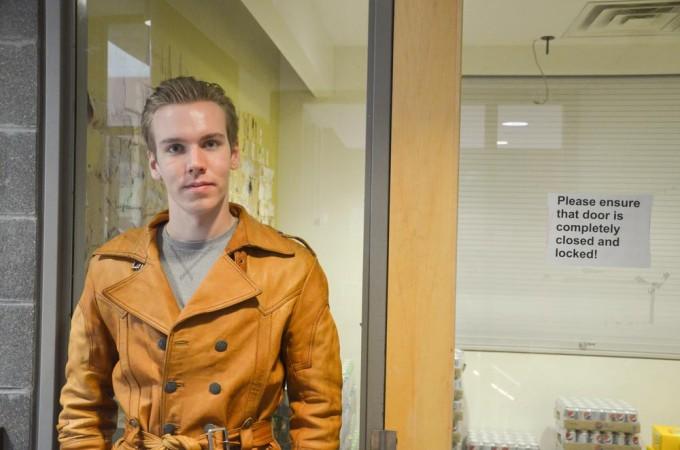By Luc Rinaldi
On the second floor of the Student Campus Centre, Kolter Bouchard raises his hands to shade his eyes as he peers through a locked doorway into the former home of CKLN. Inside, the abandoned radio station is in disrepair: drywall flakes onto stained carpets and cardboard cases of Diet Pepsi and Sky Blue organic soda line the walls of the empty – but once lively – space. “This is the reason I came to Ryerson,” says Bouchard, a fourth-year Radio and Television Arts student. “To be on this station.”
Less than two years into his Ryerson career, he realized that goal. But any celebration was short lived. On Jan. 28, 2011, a day after Bouchard hosted the inaugural episode of his eponymous radio show on CKLN, the station – already plagued by infighting and mismanagement – had its licence revoked by the Canadian Radio-television and Telecommunications Commission. Within three months, the station ceased broadcast, and by the end of the summer, they were kicked out of the SCC altogether.
The last year has seen Bouchard and others attempt to rebuild and rebrand radio on campus. After students voted last October in favour of a $10.35 levy on their tuition to support a new radio station, he was one in a group of hopefuls who submitted an application to reclaim 88.1 FM under the title of New Ryerson Radio. Except theirs was only one of 22 bids, and ultimately, it didn’t take the prize. On Sept. 11, the CRTC awarded CKLN’s former frequency to indie station Rock 95, dashing New Ryerson Radio’s hopes and instead prompting talk of what could be – in the words of Ryerson President Sheldon Levy – “the world’s best Internet radio station.”
In the two weeks since Ryerson lost the contest for 88.1 FM, there has been an uncharacteristic stillness among the university’s radio community. “Our contingency plan was… We should do an Internet radio station,” says Bouchard. “It’s been such a shock we didn’t get the frequency that I don’t think anybody’s hopped on it right now.” Meanwhile, the more than $300,000 in student levies – what would’ve been given to New Ryerson Radio had it acquired the frequency – is being held in trust.
“Nothing is being spent whatsoever,” says RSU President Rodney Diverlus. “Everything is on freeze.” Diverlus says that the next month will include meetings and decisions that will dictate how students choose what to do with the money, as well as how the school can “keep the spirit of Ryerson Radio alive.”
“There are a lot of uncertainties because this has never happened before,” he says. “When you plan for so long for one outcome and then get another, you have to go back to the drawing table… To a lot of people who were involved with Radio Ryerson, there was a shock aspect, and now we’re ready to figure out what’s next.” If an Internet radio station is in fact that next step, it won’t be an entirely novel concept for Ryerson.
RTA students already produce SPIRITlive, a 24-hour streaming Internet station that runs out of the Rogers Communication Centre.
“There are so many people who don’t even know we have an Internet radio station here,” says Bouchard, who thinks a new station could cooperate with SPIRITlive to create a new sense of community through niche, hyper-local content.
“If it’s a Ryerson radio station targeted at Ryerson students,” he adds, “it can essentially be 100 per cent Ryerson.” Lainey Dalrymple, the station manager of the internet-based Radio Laurier in Waterloo, echoes that sentiment. “With a student-based population, most people are on their computers, not in cars. So they might not use a frequency anyway,” she says. “Online is a beneficial way to go… If the station’s there in the first place and it’s for and by the community, I don’t think there’s much of a difference between being online and having a frequency.”
Dalrymple says that, beyond roughly $3,000 in annual licensing fees and the initial start-up costs of securing a space and equipment (none of which would be particularly problematic for Ryerson), Radio Laurier runs mostly off volunteer hours, advertiser sponsorships and an on-loan budget that they pay back through event earnings and fundraising.
According to Chris Shank, a colleague of Bouchard’s and a fellow champion of New Ryerson Radio, the payoff of an Internet station would be well worth the investment.
“Radio on a campus level is integral to the identity of the school,” Shank says. “Just having a dominant voice and having access to all students – it would be huge to have an online presence to represent the Ryerson community… And I have faith that will eventually happen.” Bouchard himself is equally hopeful, even if he and Shank-both final year students – aren’t the ones to spearhead the new project. “I don’t think there would ever be a problem with student support,” he says. “There are so many people who just want a chance to use this as a launching pad – to become part of the next chapter of Radio Ryerson.”










crickey
Now the desperate fight begins for the 250K left over from CKLN’s previous years and the 300K “money from home” appropriated this year for the “New Radio Ryerson” ongoing scam. Enter into the picture for the first time in a year good ol’ former member of the CKLN Board of Directors “Titanic Squad” along with his long lost buddy Shank surfacing to grab the hidden treasure for their own personal benefit. Fools. Don’t they know that the stolen money always has to go to the benefit of those allied with the RSU/CESAR/CFS etc. mafia?
Kolter
The big pointing finger hasn’t the chutzpah to reveal its real name–how brave. Also, Chris is neither lost (nor long!). You can catch us Tuesdays at 4pm only at http://www.spiritlive.net!